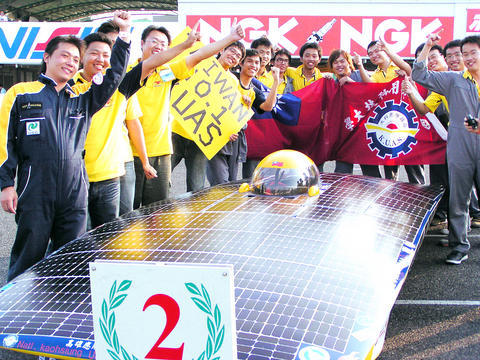Students from the National Kaohsiung University of Applied Sciences won second place in the Dream Cup solar car race in Japan earlier this month, the university's best ever performance in four years of participating in international solar car competitions.
The 18-member team competed in the top division of the 16th annual Dream Cup, which was held at the Suzuka Circuit in Suzuka City, Mie Prefecture, on Aug. 4 and Aug. 5. The students lost to the Japanese team by eight rounds in an endurance race.
The Suzuka Circuit solar car race attracted 80 teams, mostly from Japan, who competed in three divisions.

PHOTO: CNA
TOP FOREIGN TEAM
The Kaohsiung team was the only foreign crew competing in the top division against seven Japanese teams.
The Dream Cup was launched in 1992 to promote environmentally friendly vehicles.
It was created through the joint sponsorship of the Yomiuri Shimbun, Suzuka Circuitland, as well as the Japan Automobile Federation.
RIVAL MODELS
After the race, the Kaohsiung competitors said that their Japanese rival solar cars were very well-built and performed better because of higher stability.
"There is certainly ample room for us to improve our equipment and techniques," a student said.
AEROSPACE STANDARDS
The solar car model developed by the university employs solar panels on a par with US aerospace industrial standards, the team said.
Nevertheless, the model is far less efficient than today's commercial cars, the students said.
The students said that they had gained valuable experience making and using environmentally friendly solar cars, which they said are a rising star in the field of transportation.
The university's team is the only one of its kind in Taiwan and has participated in international solar car races since 2003.

Japanese footwear brand Onitsuka Tiger today issued a public apology and said it has suspended an employee amid allegations that the staff member discriminated against a Vietnamese customer at its Taipei 101 store. Posting on the social media platform Threads yesterday, a user said that an employee at the store said that “those shoes are very expensive” when her friend, who is a migrant worker from Vietnam, asked for assistance. The employee then ignored her until she asked again, to which she replied: "We don't have a size 37." The post had amassed nearly 26,000 likes and 916 comments as of this

US President Donald Trump said "it’s up to" Chinese President Xi Jinping (習近平) what China does on Taiwan, but that he would be "very unhappy" with a change in the "status quo," the New York Times said in an interview published yesterday. Xi "considers it to be a part of China, and that’s up to him what he’s going to be doing," Trump told the newspaper on Wednesday. "But I’ve expressed to him that I would be very unhappy if he did that, and I don’t think he’ll do that," he added. "I hope he doesn’t do that." Trump made the comments in

Tourism in Kenting fell to a historic low for the second consecutive year last year, impacting hotels and other local businesses that rely on a steady stream of domestic tourists, the latest data showed. A total of 2.139 million tourists visited Kenting last year, down slightly from 2.14 million in 2024, the data showed. The number of tourists who visited the national park on the Hengchun Peninsula peaked in 2015 at 8.37 million people. That number has been below 2.2 million for two years, although there was a spike in October last year due to multiple long weekends. The occupancy rate for hotels

A cold surge advisory was today issued for 18 cities and counties across Taiwan, with temperatures of below 10°C forecast during the day and into tonight, the Central Weather Administration (CWA) said. New Taipei City, Taipei, Taoyuan and Hsinchu, Miaoli and Yilan counties are expected to experience sustained temperatures of 10°C or lower, the CWA said. Temperatures are likely to temporarily drop below 10°C in most other areas, except Taitung, Pingtung, Penghu and Lienchiang (Matsu) counties, CWA data showed. The cold weather is being caused by a strong continental cold air mass, combined with radiative cooling, a process in which heat escapes from